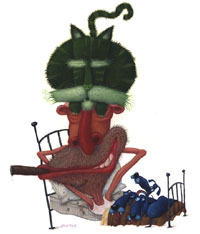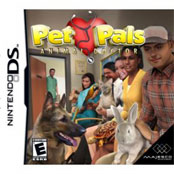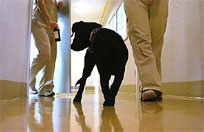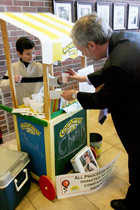Animal Radio® Show #418 December 1, 2007
Strange Bedfellows
Kinky Friedman, Howl
 Do you know that Al Franken's dog
Kirby eats poop but Al loves (and kisses) Kirby anyway; that Dave
Barry really, really wants a dog; and that Kinky Friedman sleeps
with his four dogs and a cat named lady (and a shot gun!)? Find
out this and more in Howl, a Collection of the Best Contemporary
Dog Wit By the Editors of Bark.
Do you know that Al Franken's dog
Kirby eats poop but Al loves (and kisses) Kirby anyway; that Dave
Barry really, really wants a dog; and that Kinky Friedman sleeps
with his four dogs and a cat named lady (and a shot gun!)? Find
out this and more in Howl, a Collection of the Best Contemporary
Dog Wit By the Editors of Bark.
 Kinky not
only discusses his sleeping arrangements (his cat sleeps on his
head, surrounded by four dogs) but talks about Dilly, his pet
armadillo, and his run for governor of Texas.
Kinky not
only discusses his sleeping arrangements (his cat sleeps on his
head, surrounded by four dogs) but talks about Dilly, his pet
armadillo, and his run for governor of Texas.
Kinky runs the Utopia Animal Rescue Ranch,
which is currently home to 60 dogs, 10 pigs, 3 donkeys, horses
and cats, which are available for adoption. Please check out the
Utopia
Ranch for more information.
http://www.kinkyfriedman.com
Puppy for Christmas Survival Plan
Vladae, The Dog Wizard
 Puppies for Christmas are not always
the smartest decision. But, Vladae shares some surprising tips
and tactics to make this irresistible gift idea work.
Puppies for Christmas are not always
the smartest decision. But, Vladae shares some surprising tips
and tactics to make this irresistible gift idea work.
Christmas Puppy Survival Outline:
- How to choose the right puppy for the
family.
- What you must do immediately after getting
a new puppy.
- The two biggest mistakes new dogs owners
make and how to avoid them.
- One simple training technique that will
save you sleepless nights, chewed shoes, and soiled carpets.
Listen in as Vladae also helps a caller
with her problem at the end of the leash. He offers some great
tips for a dog with separation anxiety.
Do you need help with your dog? Call us
at 866-405-8405 and we will schedule you to personally speak with
Vladae.
http://www.vladae.com
Guideline to Detecting Pet's Hidden Pain
Dr. Tom Carpenter, AAHA
 To protect themselves from predators,
animals naturally hide their pain. Your pet may be suffering even
though he isn't showing obvious signs. Advancements in veterinary
science have decoded subtle telltale signs of animal distress.
Observing your pet's behavior is vital to managing his or her
pain. How well do you know your pet? Use these five clues from
the American Animal Hospital Association (AAHA) to help you understand
your pet's body language.
To protect themselves from predators,
animals naturally hide their pain. Your pet may be suffering even
though he isn't showing obvious signs. Advancements in veterinary
science have decoded subtle telltale signs of animal distress.
Observing your pet's behavior is vital to managing his or her
pain. How well do you know your pet? Use these five clues from
the American Animal Hospital Association (AAHA) to help you understand
your pet's body language.
Clue 1- Abnormal chewing habits
If your pet is showing abnormal chewing habits, such as dropping
its food or chewing on one side of the mouth, it may have a dental
disorder or a mouth tumor. Additional signs may include weight
loss, bad breath or excessive face rubbing. Routine dental checkups
are important to prevent and treat dental disorders and related
pain.
Clue 2- Drastic weight gain or loss
Pain directly influences your pet's weight and eating habits.
Animals carrying excess weight have an increased chance of tearing
ligaments and damaging joints. Pets with arthritis or muscle soreness
may not want to access their food because bending over is uncomfortable.
Arthritis pain may also cause pets to gain weight while their
eating habits remain the same due to lack of exercise.
Clue 3- Avoids affection or handling
Did Fluffy used to be active and energetic, but now sits quietly
around the house? Avoiding affection or handling may be a sign
of a progressive disease such as osteoarthritis or intervertebral
disc disease. Although your pet may appear to be normal before
petting or handling it, the added pressure applied to its body
may expose sensitive and painful areas.
Clue 4- Decreased movement and exercise
Arthritis or degenerative joint diseases (DJD) is the most common
cause of pain. Pets that limp may be reluctant to go up or down
stairs, exercise, or play. Weight and joint injuries can also
go hand-in-hand. Losing unnecessary pounds will help overweight
pets decrease pressure on sore joints and reduce pain. Consult
your veterinarian about exercises; diets and pain medications
that can help improve your pet's health.
 Clue
5 - Excessively licking or biting itself
Clue
5 - Excessively licking or biting itself
It is normal for a pet to groom itself by licking, but you should
know your pet and know if they are doing this excessively.
Clue 6- Uncharacteristic "Accidents"
Pet owners often believe that "accidents" are a result
of behavioral issues. Although behavioral issues may cause unwanted
surprises, going to the bathroom in inappropriate places may be
caused by pain. Pets with sore joints or arthritis may not make
it to a convenient location due to painful obstacles like stairs.
Urinary tract infections also may cause
a messy situation. In addition to having "accidents,"
symptoms of a urinary tract infection may include, lethargy, fever,
tender lower abdomen and difficulty urinating.
The lack of verbal expression does not
mean that your pet is not experiencing pain. Minor behavioral
change can be cause for alarm. Being aware of your pet's habits
can help you and your veterinarian assess and treat your pet's
pain. Diagnosing and managing pain is among the 900 standards
an animal hospital is evaluated on in order to become accredited
through AAHA. For more information or to locate an AAHA-accredited
hospital, visit http://www.healthypet.com.
http://www.aahanet.org
Pets as Gifts
Dr. Jim Humphries, Veterinary
News Network
 Cute,
cuddly, a lifelong companion. Seems like the perfect gift for
someone, doesn't it? But is it? Although everyone has their reasons
for wanting to give a pet as a gift, really anytime of the year,
there are many more reasons for you to think twice before doing
so. Many people have a great childhood memory of getting a puppy
or a kitten as a gift, but most won't remember the training and
the efforts their parents went through to make the new pet a part
of the family. From housebreaking to socialization, we've probably
forgotten the time investment it takes to create a great pet.
Cute,
cuddly, a lifelong companion. Seems like the perfect gift for
someone, doesn't it? But is it? Although everyone has their reasons
for wanting to give a pet as a gift, really anytime of the year,
there are many more reasons for you to think twice before doing
so. Many people have a great childhood memory of getting a puppy
or a kitten as a gift, but most won't remember the training and
the efforts their parents went through to make the new pet a part
of the family. From housebreaking to socialization, we've probably
forgotten the time investment it takes to create a great pet.
Experts from humane organizations, veterinarians
and breeders all agree that the holidays are the worst time to
introduce a pet into the household. The unusual environment of
the holiday season can be overwhelming to a puppy or a kitten
who's just left the safety of a litter. Many people fail to realize
that just when a puppy is old enough to go home, he's learning
many critical things. Even though everyone is well intentioned,
poor training and socialization during this time frame can lead
to a problem pet and later a decision to give up the pet for adoption.
Behavior problems are a major reason pets end up in our shelters.
You may decide giving a pet is a good idea, but remember you're
also giving someone a 10-15 year commitment of care.
Before deciding on any pet, talk with
your veterinarian and make sure your recipient is equipped to
handle the responsibility. I think most people don't really think
of the long-term nature of a pet's life and the commitment and
the care that goes with this gift. For some it might be a great
idea; for others, it might be a problem, and frankly unfair to
the animal. Perhaps a gift from a humane shelter or a rescue club
of a gift certificate might be a great idea.
http://www.VetNewsNet.com
NEWS UPDATE: Pet Pals Animal
Doctor Video Game
 There are so many video games on
the market, so it was time they came up with something new. Majesco
Entertainment recently announced Pet Pals: Animal Doctor for the
Nintendo DS.
There are so many video games on
the market, so it was time they came up with something new. Majesco
Entertainment recently announced Pet Pals: Animal Doctor for the
Nintendo DS.
This new game allows players to basically "play veterinarian"
and diagnose and treat over 30 different types of medical cases,
which have been created by real-life veterinarians. The medical
cases run from hairballs to broken bones.
Players can learn the different techniques
required to diagnose and treat 23 different pets, which include
everything from cats and dogs to turtles, a python, a rabbit and
a hamster. The player must successfully administer more than 40
Touch Screen tests, while they deal with stressed animals and
concerned guardians.
When the treatment has been completed,
you can then feed and play with the animal while it is recovering
in the Recovery Room to help improve the animals spirits.
 NEWS UPDATE
Brought To You By Simple Solution Natural Line Of Products
NEWS UPDATE
Brought To You By Simple Solution Natural Line Of Products
When to Vaccinate
Dr. Debbie White, Lone Mountain
Animal Hospital
 A current certified Rabies vaccination
is required for the licensing of your dog or cat for all states.
All other vaccinations are strongly recommended for the well-being
of your pet and usually required by pet-care facilities before
any services are rendered.
A current certified Rabies vaccination
is required for the licensing of your dog or cat for all states.
All other vaccinations are strongly recommended for the well-being
of your pet and usually required by pet-care facilities before
any services are rendered.
Why vaccinate? A proper vaccination series
is necessary for the health and protection of your pet. Newborn
puppies and kittens obtain antibodies from their mother. Over
the course of the first few months of their life these maternal
antibodies fade and leave the pet susceptible to disease. This
is why we must give vaccinations to ensure protection from disease.
We must give puppies and kittens a series
of vaccines (boosters) to ensure their immune systems are stimulated
as their maternal immunity is wearing off. With each booster vaccination
their immune system becomes stronger to fight off disease. One
or two vaccines alone should not be relied upon to be protective.
Often times pets may develop disease when the pet receives an
incomplete vaccine series. Because adult animals' immunity can
wane with time, adult boosters are needed to ensure protective
immunity.
Canine Annual Wellness Schedule:
"Core" vaccines are the minimum
vaccines recommended for puppies. These include Distemper, Parvovirus,
Bordatella, and Rabies.
"Non-core" vaccines are those
necessitated by lifestyle and health risk. These include Lyme
(a tick-borne disease; the vaccine is a 2-series vaccine administered
4 weeks apart for dogs 12 weeks and older), and Porphyromonas
(a vaccine which helps prevent tooth loss from periodontal disease;
it is a 2-series vaccine administered 21 days apart for dogs 8
weeks and older).
Feline Annual Wellness Schedule:
"Core" vaccines are the minimum
vaccines recommended for kittens. These include ENT-FVRC and Rabies.
"Non-core" vaccines are those
necessitated by lifestyle and health risk. These include FeLV.
To be sure your pet receives all the necessary
vaccinations, please check with your veterinarian.
http://www.lmah.net
Puppy Peg Gets a Leg Up With a Prosthetic
Britt Savage
 Peg the three-legged dog might
not be as famous as Lassie, but she quickly became a world-renowned
pup. The 4-month-old retriever has become a canine celebrity,
making appearances on The Discovery Channel Canada, "The
Tucker Carlson Show" on MSNBC, and likely will be featured
on "Inside Edition."
Peg the three-legged dog might
not be as famous as Lassie, but she quickly became a world-renowned
pup. The 4-month-old retriever has become a canine celebrity,
making appearances on The Discovery Channel Canada, "The
Tucker Carlson Show" on MSNBC, and likely will be featured
on "Inside Edition."
Peg also was also interviewed by Rex Miller,
owner of The Greater Flint Prosthetic Center. Miller lost his
right leg when he was 15 and made Peg's prosthetic. Peg was born
without the equivalent of a human ankle, plus her right paw. Peg's
owner, Carol Beavnier of Macomb Township, who trains leader dogs
for the blind, looked on a Web site for handicapped pets, and
after a few phone calls found Miller. Miller had never created
a prosthetic for a dog before, and he's donating his services
and equipment, which normally would have cost several thousand
dollars.
Peg's new leg will be made out of material
similar to that used in bulletproof vests so she can't chew through
her leg. When Peg is done being a celebrity, she will be a therapy
dog, visiting people in nursing homes.
Child Raises Over $30,000 for the Animals
Kyle Orent
 Kyle Orent is a 9-year-old from Northport,
New York who raised more than $20,000 selling lemonade.
Kyle Orent is a 9-year-old from Northport,
New York who raised more than $20,000 selling lemonade.
His next endeavor was to auction off celebrity-autographed
dog collars (donated by Bamboo). Some of the celebrities that
autographed those collars were Leslie Nielson, Betty White, Sheena
Easton, Joe Namath, Donald Trump, Billy Joel and Dean Koontz (whose
collars collected the highest bid) to name a few. He raised over
$5,000 for his collars and was matched by a generous donation
from someone who wished to remain anonymous, raising the total
to $10,300.
Kyle then donated it all, $30,300, to
Canine
Companions for Independence. When asked why he chose this
charity, Kyle says he is a big animal lover and likes how these
animals have been trained to assist their humans and wants to
help.
It was a pleasure working with this child
whose love for the animals is so obvious. We only hope to be involved
in his next endeavor. Cheers to you Kyle!
Listen to the
entire Podcast of this show (#418).
 Listen to Animal Radio®
- Go to the launch page
Listen to Animal Radio®
- Go to the launch page
 Return to Animal Radio Network™ Home Page
Return to Animal Radio Network™ Home Page
 Read
November Newsletter
Read
November Newsletter
Copyright 2007 All Rights
Reserved Animal Radio Network LLC
 Do you know that Al Franken's dog
Kirby eats poop but Al loves (and kisses) Kirby anyway; that Dave
Barry really, really wants a dog; and that Kinky Friedman sleeps
with his four dogs and a cat named lady (and a shot gun!)? Find
out this and more in Howl, a Collection of the Best Contemporary
Dog Wit By the Editors of Bark.
Do you know that Al Franken's dog
Kirby eats poop but Al loves (and kisses) Kirby anyway; that Dave
Barry really, really wants a dog; and that Kinky Friedman sleeps
with his four dogs and a cat named lady (and a shot gun!)? Find
out this and more in Howl, a Collection of the Best Contemporary
Dog Wit By the Editors of Bark. Kinky not
only discusses his sleeping arrangements (his cat sleeps on his
head, surrounded by four dogs) but talks about Dilly, his pet
armadillo, and his run for governor of Texas.
Kinky not
only discusses his sleeping arrangements (his cat sleeps on his
head, surrounded by four dogs) but talks about Dilly, his pet
armadillo, and his run for governor of Texas. Puppies for Christmas are not always
the smartest decision. But, Vladae shares some surprising tips
and tactics to make this irresistible gift idea work.
Puppies for Christmas are not always
the smartest decision. But, Vladae shares some surprising tips
and tactics to make this irresistible gift idea work. To protect themselves from predators,
animals naturally hide their pain. Your pet may be suffering even
though he isn't showing obvious signs. Advancements in veterinary
science have decoded subtle telltale signs of animal distress.
Observing your pet's behavior is vital to managing his or her
pain. How well do you know your pet? Use these five clues from
the American Animal Hospital Association (AAHA) to help you understand
your pet's body language.
To protect themselves from predators,
animals naturally hide their pain. Your pet may be suffering even
though he isn't showing obvious signs. Advancements in veterinary
science have decoded subtle telltale signs of animal distress.
Observing your pet's behavior is vital to managing his or her
pain. How well do you know your pet? Use these five clues from
the American Animal Hospital Association (AAHA) to help you understand
your pet's body language. Clue
5 - Excessively licking or biting itself
Clue
5 - Excessively licking or biting itself Cute,
cuddly, a lifelong companion. Seems like the perfect gift for
someone, doesn't it? But is it? Although everyone has their reasons
for wanting to give a pet as a gift, really anytime of the year,
there are many more reasons for you to think twice before doing
so. Many people have a great childhood memory of getting a puppy
or a kitten as a gift, but most won't remember the training and
the efforts their parents went through to make the new pet a part
of the family. From housebreaking to socialization, we've probably
forgotten the time investment it takes to create a great pet.
Cute,
cuddly, a lifelong companion. Seems like the perfect gift for
someone, doesn't it? But is it? Although everyone has their reasons
for wanting to give a pet as a gift, really anytime of the year,
there are many more reasons for you to think twice before doing
so. Many people have a great childhood memory of getting a puppy
or a kitten as a gift, but most won't remember the training and
the efforts their parents went through to make the new pet a part
of the family. From housebreaking to socialization, we've probably
forgotten the time investment it takes to create a great pet. There are so many video games on
the market, so it was time they came up with something new. Majesco
Entertainment recently announced Pet Pals: Animal Doctor for the
Nintendo DS.
There are so many video games on
the market, so it was time they came up with something new. Majesco
Entertainment recently announced Pet Pals: Animal Doctor for the
Nintendo DS.  NEWS UPDATE
Brought To You By
NEWS UPDATE
Brought To You By  A current certified Rabies vaccination
is required for the licensing of your dog or cat for all states.
All other vaccinations are strongly recommended for the well-being
of your pet and usually required by pet-care facilities before
any services are rendered.
A current certified Rabies vaccination
is required for the licensing of your dog or cat for all states.
All other vaccinations are strongly recommended for the well-being
of your pet and usually required by pet-care facilities before
any services are rendered. Peg the three-legged dog might
not be as famous as Lassie, but she quickly became a world-renowned
pup. The 4-month-old retriever has become a canine celebrity,
making appearances on The Discovery Channel Canada, "The
Tucker Carlson Show" on MSNBC, and likely will be featured
on "Inside Edition."
Peg the three-legged dog might
not be as famous as Lassie, but she quickly became a world-renowned
pup. The 4-month-old retriever has become a canine celebrity,
making appearances on The Discovery Channel Canada, "The
Tucker Carlson Show" on MSNBC, and likely will be featured
on "Inside Edition." Kyle Orent is a 9-year-old from Northport,
New York who raised more than $20,000 selling lemonade.
Kyle Orent is a 9-year-old from Northport,
New York who raised more than $20,000 selling lemonade.